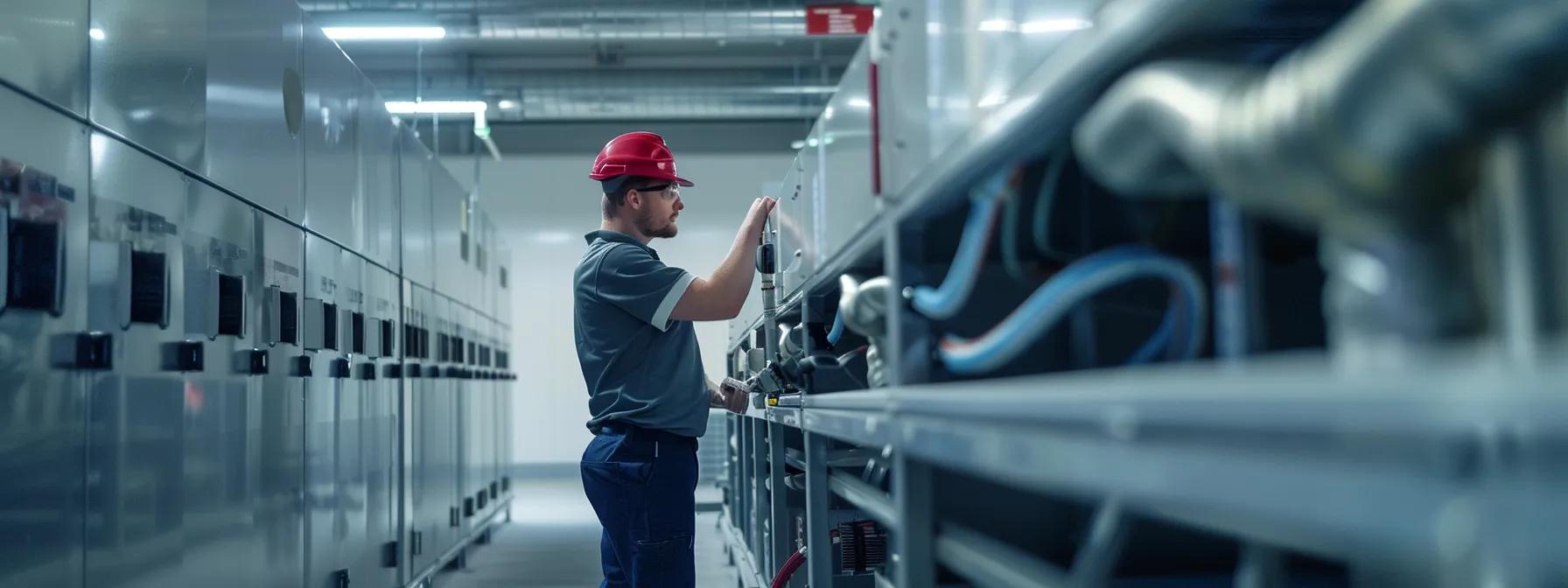Essential HVAC Compliance Requirements in Savannah GA

Exploring Savannah GA HVAC Compliance: Key Requirements Explained
Every homeowner in Savannah, GA must understand HVAC compliance to ensure both family safety and system efficiency, especially when managing furnaces and heat-pumps. HVAC compliance involves following local, state, and federal regulations governing heating, ventilation, and air conditioning systems. Compliance is essential to avoid fines, preserve property value, and safeguard public health. Homeowners who maintain compliance and invest in proper maintenance plans benefit from optimal system performance and extended equipment lifespan, while non-compliance can lead to inefficient operation, unsafe installations, or legal complications.
Understand the Basics of HVAC Compliance in Savannah GA
HVAC compliance in Savannah, GA means meeting all regulatory requirements imposed by local authorities on installing and operating heating, ventilation, and air conditioning systems. This ensures systems are safely installed, operate efficiently, and meet environmental standards. Understanding these regulations helps homeowners avoid fines, reduce energy costs, and maintain healthy indoor environments.
Define HVAC Compliance and Why It Matters in Savannah
HVAC compliance means adhering to local, state, and federal regulations for installation, maintenance, and inspection. In Savannah, strict building codes and energy efficiency standards reduce risks such as fire hazards, carbon monoxide exposure, and energy inefficiency. For example, compliant HVAC installations can reduce the risk of system malfunctions by 35%, protecting both property and occupants.
Identify Local Regulations That Affect HVAC Systems
Local regulations set requirements for installation, performance, noise, emissions, and energy efficiency. The Savannah Building Department enforces codes for materials, safety clearances, and certifies HVAC equipment. Additionally, local ordinances incorporate international energy conservation codes with modifications suited to the region’s climate, ensuring systems are safe and optimized for humid, Southern coastal weather.
Explore the Role of Inspections in Ensuring Compliance
Regular inspections verify that HVAC systems are installed according to regulatory codes. In Savannah, certified inspectors check for proper ventilation, sealing, and electrical load capacities during and after installation. These inspections help identify safety hazards early and support optimal system performance, reducing breakdowns and improving energy efficiency.
Recognize Benefits of Staying Compliant With HVAC Standards
Compliance with HVAC standards offers improved system efficiency, enhanced indoor air quality, lower energy bills, and reduced fire hazards or carbon monoxide risks. Properly maintained systems can last up to 20% longer and reduce repair needs by roughly 25%, giving homeowners peace of mind regarding safety and performance.
Analyze Common Compliance Issues Faced by Residents
Common issues include improper installation, incomplete repair documentation, outdated equipment, and missed routine maintenance. Homeowners may face problems by using uncertified contractors or skipping inspections, which can lead to fines or non-compliance notices. Addressing issues such as inadequate ventilation early on through routine maintenance and professional consultation is key to lasting compliance.
Familiarize Yourself With HVAC Permitting Requirements

HVAC permitting involves obtaining legal authorizations from local government bodies to ensure that installed systems meet required codes and standards. Without proper permits, homeowners risk fines and potential issues with insurance claims. Securing these permits is essential for the legal and safe operation of HVAC systems in Savannah.
Investigate the Process for Obtaining HVAC Permits
Obtaining HVAC permits in Savannah requires submitting an application to the local building department. This application includes specifications on the type of system, detailed schematics, and installer qualifications. The permit is reviewed for compliance with building codes, energy regulations, and safety standards, and once approved, it must be visibly displayed during installation. Timely and accurate documentation can reduce processing times by up to 30%.
Review Necessary Documentation for Permit Applications
HVAC permit applications require detailed system plans, proof of contractor licensure, equipment certifications, and energy efficiency test results. Homeowners must often provide previous inspection reports and maintenance records. Supporting documents, such as environmental impact assessments and load calculations, help streamline the permitting process and serve as evidence of ongoing compliance during future inspections or property resale.
Examine Costs Associated With HVAC Permits
Permit fees in Savannah vary by project scope and complexity, typically ranging from $100 to $500 or more, with higher fees for large-scale installations or retrofits. Additional expenses may include inspection fees and certification costs. Although these fees are an upfront investment, they protect homeowners from future legal issues and promote safer, more efficient HVAC operation.
Learn About Permit Renewal Processes for HVAC Systems
Permit renewals are necessary when modifications are made or when the original permit expires. Homeowners need to be aware of renewal deadlines and updated code changes. Renewals generally require submitting a new application with updated inspection reports and system performance data. Failure to renew on time can lead to penalties and re-inspections, delaying repairs. Regular renewals ensure that HVAC systems remain safe and compliant in a changing regulatory environment.
Get to Know Key HVAC Codes and Standards
Key HVAC codes and standards set benchmarks for safety, energy efficiency, and performance. These codes are based on national and international standards and are tailored by local jurisdictions to meet regional conditions. Understanding these codes is crucial for keeping HVAC systems within legal and operational guidelines.
Find Out About International Codes Affecting HVAC
International codes, such as the International Mechanical Code (IMC) and the International Energy Conservation Code (IECC), provide a framework for the safe installation, performance, and energy efficiency of HVAC systems. In Savannah, these codes serve as a baseline, supplemented by local amendments that address region-specific weather challenges. Compliance with these international guidelines can result in energy savings of around 10–15% compared to non-compliant systems.
Study the Impact of Local Building Codes on HVAC Units
Local building codes in Savannah directly affect HVAC installations by prescribing installation standards, insulation requirements, and ventilation guidelines. These codes require that HVAC systems be installed by licensed professionals using energy-efficient equipment. For example, furnace installations may need safety shut-offs, and air conditioners must maintain proper refrigerant levels to meet environmental safety standards. Non-compliance with these codes can result in fines and inefficient energy use.
Compare HVAC Standards for Residential vs. Commercial Use
Residential HVAC systems emphasize quiet operation, energy efficiency, and user-friendly controls, while commercial systems must accommodate larger spaces, higher occupancy, and more complex zoning requirements. Commercial installations often require more rigorous inspections and detailed designs to handle extended operational hours. Residential systems are designed for simplicity and efficiency, whereas commercial systems cater to scalability and robustness.
Assess Environmental Laws Relevant to HVAC Operations
Environmental regulations for HVAC systems are focused on reducing greenhouse gas emissions, enhancing energy efficiency, and promoting sustainable practices. In Savannah, HVAC systems must comply with local initiatives, including limits on refrigerant usage and energy-efficient ratings. Federal standards from the EPA require regular leak inspections and proper disposal of hazardous materials. Compliant systems can reduce utility bills by up to 20% and contribute to broader environmental efforts.
Maintain Your HVAC System for Compliance

Maintaining HVAC compliance means regular servicing, thorough inspections, and proactive maintenance measures to ensure peak system performance. Homeowners in Savannah who regularly service their systems benefit from energy savings and enhanced safety.
Schedule Regular Maintenance Checks for Your HVAC
Routine maintenance by certified technicians is critical for ensuring HVAC compliance. Maintenance typically involves cleaning filters, verifying electrical connections, inspecting ductwork, and testing refrigerant levels. Annual maintenance—ideally before peak usage seasons—helps prevent minor issues from becoming major problems and avoids compliance issues during inspections.
Create a Maintenance Checklist to Ensure Compliance
A detailed maintenance checklist helps guarantee consistent HVAC performance. Essential tasks include replacing filters, cleaning ducts, inspecting electrical wiring, and calibrating thermostats. Following such a checklist can minimize downtime and document compliance efforts, which is beneficial during inspections or if discrepancies arise later.
Identify Signs That Your HVAC Needs Attention
Common signs that an HVAC system needs service include unusual noises, inconsistent temperatures, increased energy bills, and reduced air quality. Early detection of issues like refrigerant leaks, dirty coils, or failing motors can prevent further damage and expensive repairs. Homeowners noticing these signs should promptly contact a qualified technician to restore compliance and efficiency.
Understand the Importance of Professional HVAC Services
Professional HVAC services are essential for maintaining long-term system reliability and compliance. Licensed technicians are familiar with complex regulatory standards and can perform precision maintenance and safe repairs. Utilizing experienced professionals minimizes the risk of errors, reduces energy consumption, and ensures that work meets stringent regulatory and safety standards.
Explore Common HVAC Compliance Violations
Violations of HVAC compliance typically stem from improper installation, insufficient maintenance, or failure to upgrade equipment to current codes. Recognizing these issues early helps prevent safety hazards and avoids costly fines.
Identify Common Violations Found in Residential HVAC Systems
Common problems include improper installation, incomplete documentation, outdated equipment, and ignoring new local code modifications. Many homeowners may neglect permits or timely inspections, which can lead to non-compliant setups that pose fire hazards or inefficiencies. Other issues include unlicensed contractor work, incorrect refrigerant handling, and failure to upgrade components. Recognizing these pitfalls allows for prompt corrective action.
Understand the Consequences of Non-Compliance
Non-compliance with HVAC regulations can result in hefty fines, system shutdowns, or expensive retrofits. It also increases the risk of property damage, energy wastage, or health hazards due to poor indoor air quality. Additionally, non-compliance can affect home insurance policies and resale values. In some cases, significant investments are required to retrofit or replace non-compliant systems, underscoring the importance of adhering to regulations.
Learn How to Address HVAC Violations Effectively
Effectively addressing HVAC violations involves corrective maintenance, professional consultations, and updating permits as needed. Homeowners should start with a professional inspection to identify non-compliance issues, then take remedial actions such as system upgrades, re-installation, or documentation updates. Collaborating with licensed contractors who understand both local and federal regulations ensures that corrective measures are properly executed.
Review Case Studies of Compliance Issues in Savannah
Real-world cases in Savannah demonstrate that proactive maintenance and adherence to permit guidelines significantly reduce compliance issues. For instance, one homeowner faced repeated fines due to an improperly installed air purifier system violating local ventilation codes. After consulting with licensed professionals and updating the system, the violations were resolved and future inspections were passed without issue. Such examples highlight the benefits of a comprehensive compliance strategy.
Stay Informed About Updates in HVAC Regulations

Keeping up with HVAC regulation updates is crucial for maintaining system compliance and efficiency. Regulatory policies regularly evolve to incorporate new technologies, safety standards, and environmental concerns, making ongoing education essential.
Follow Local Government Resources for HVAC Compliance
Local government websites, such as the Savannah Building Department, provide up-to-date information on HVAC regulations, permit processes, and inspection schedules. These resources offer guidelines, FAQs, and contact information—helpful for homeowners needing clarification on compliance requirements.
Sign Up for Newsletters Focused on HVAC Regulations
Newsletters from reputable HVAC organizations and local regulatory bodies deliver timely updates on new codes, maintenance tips, and compliance best practices. They alert homeowners to upcoming changes, potential fines, and system vulnerabilities, allowing for proactive scheduling of maintenance and service.
Attend Local Workshops About HVAC Compliance Updates
Workshops and seminars provide hands-on learning opportunities that allow homeowners to engage directly with industry experts and regulatory officials. These sessions cover the latest trends, practical maintenance approaches, and problem-solving strategies for common compliance issues, fostering community connections and improving system performance.
Participate in Community Forums on HVAC Issues and Trends
Community forums—both online and in-person—are excellent venues for discussing HVAC challenges and sharing practical advice. Homeowners can learn from peers, receive early warnings about regulatory changes, and gather practical tips for maintaining compliance. Active participation in these discussions often leads to better preparedness for any regulatory updates.
Frequently Asked Questions
Q: What happens if my HVAC system is not compliant? A: Non-compliant HVAC systems can result in fines, system shutdowns, or costly retrofits, and may compromise indoor safety and increase energy bills.
Q: How often should I schedule maintenance to ensure HVAC compliance? A: Professional maintenance should be scheduled at least once a year, and more frequently if the system is older or heavily used.
Q: Can I perform HVAC maintenance myself to remain compliant? A: While basic tasks like filter changes can be done independently, professional inspections and servicing are necessary for full compliance.
Q: Are there any financial benefits to keeping an HVAC system compliant? A: Yes. Compliant systems run more efficiently, resulting in lower energy bills, fewer repairs, and a longer lifespan, which all translate to cost savings.
Q: How do I know if I need a permit for a new HVAC installation or upgrade? A: Permitting requirements vary by project scope and local regulations. It is best to consult licensed HVAC professionals and contact the Savannah Building Department.
Q: Where can I find the latest HVAC code updates in Savannah? A: The Savannah Building Department website and local government newsletters are reliable sources for the most recent HVAC code updates and compliance guidelines.
Q: What should I do if I receive a compliance violation notice? A: Immediately contact a licensed HVAC contractor to assess and rectify the issue, and work with local authorities to update any necessary documentation.
Q: Is it worth upgrading my HVAC system to maintain compliance? A: Upgrading your HVAC system can be a wise investment, as newer models typically offer improved energy efficiency, enhanced performance, and easier compliance with current codes.
Final Thoughts
The journey to maintain HVAC compliance in Savannah, GA is multifaceted, involving strict adherence to local regulations, regular maintenance, and proactive updates to your system. Homeowners benefit from enhanced indoor comfort, lower energy costs, and reduced risks of legal penalties and safety hazards. By following clear guidelines, scheduling regular inspections, and staying informed about regulatory updates, you can ensure that your HVAC system operates safely and efficiently. Strategic investments in compliance lead to long-term savings and peace of mind, reinforcing the value of informed and diligent HVAC maintenance.